

Analytic philosophy. Analytic philosophy (sometimes analytical philosophy) is a style of philosophy that came to dominate English-speaking countries in the 20th century.
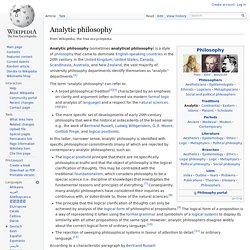
World view. Origins[edit] Linguistics[edit] The founder of the idea that language and worldview are inextricable is the Prussian philologist, Wilhelm von Humboldt (1767–1835).

Humboldt argued that language was part of the creative adventure of mankind[vague]. Culture, language and linguistic communities developed simultaneously, he argued, and could not do so without one another. In stark contrast to linguistic determinism, which invites us to consider language as a constraint, a framework or a prison house, Humboldt maintained that speech is inherently and implicitly creative. Edward Sapir also gives an account of the relationship between thinking and speaking in English. Friedrich Nietzsche. Friedrich Wilhelm Nietzsche (/ˈniːtʃə/[1] or /ˈniːtʃi/;[2] German: [ˈfʁiːdʁɪç ˈvɪlhɛlm ˈniːt͡sʃə]; 15 October 1844 – 25 August 1900) was a German philosopher, cultural critic, poet, composer and Latin and Greek scholar.
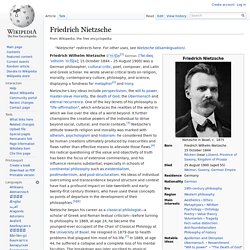
He wrote several critical texts on religion, morality, contemporary culture, philosophy and science, displaying a fondness for metaphor[3] and irony. Nietzsche's key ideas include perspectivism, the will to power, the death of God, the Übermensch and eternal recurrence. One of the key tenets of his philosophy is "life-affirmation", which embraces the realities of the world in which we live over the idea of a world beyond. Nietzsche began his career as a classical philologist—a scholar of Greek and Roman textual criticism—before turning to philosophy. In 1869, at age 24, he became the youngest-ever occupant of the Chair of Classical Philology at the University of Basel. Existentialism. Existentialism is a term applied to the work of certain late 19th- and 20th-century philosophers who, despite profound doctrinal differences,[1][2][3] shared the belief that philosophical thinking begins with the human subject—not merely the thinking subject, but the acting, feeling, living human individual.[4] In existentialism, the individual's starting point is characterized by what has been called "the existential attitude", or a sense of disorientation and confusion in the face of an apparently meaningless or absurd world.[5] Many existentialists have also regarded traditional systematic or academic philosophies, in both style and content, as too abstract and remote from concrete human experience.[6][7] Definitional issues and background[edit] There has never been general agreement on the definition of existentialism.
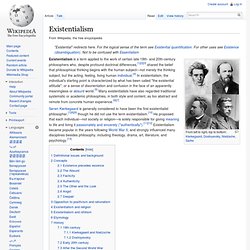
The term is often seen as an historical convenience as it was first applied to many philosophers in hindsight, long after they had died. Søren Kierkegaard. Søren Aabye Kierkegaard (/ˈsɔrən ˈkɪərkəɡɑrd/ or /ˈkɪərkəɡɔr/; Danish: [ˈsɶːɐn ˈkiɐ̯ɡəɡɒːˀ] (
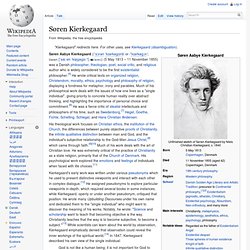
Arthur Schopenhauer. Life[edit] Schopenhauer's birthplace house, ul.
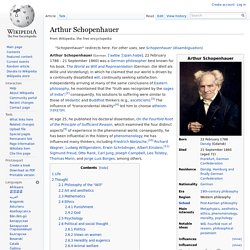
Św. Ducha (formerly Heiligegeistgasse) In 1814, Schopenhauer began his seminal work The World as Will and Representation (Die Welt als Wille und Vorstellung). He finished it in 1818 and published it the following year. While in Berlin, Schopenhauer was named as a defendant in a lawsuit initiated by a woman named Caroline Marquet.[18] She asked for damages, alleging that Schopenhauer had pushed her. In 1821, he fell in love with nineteen-year old opera singer, Caroline Richter (called Medon), and had a relationship with her for several years. Schopenhauer had a notably strained relationship with his mother Johanna Schopenhauer. Grave at Frankfurt Hauptfriedhof. Kant's Aesthetics and Teleology. First published Sat Jul 2, 2005; substantive revision Wed Feb 13, 2013 Kant's views on aesthetics and teleology are given their fullest presentation in his Critique of Judgment (Kritik der Urteilskraft, also translated Critique of the Power of Judgment), published in 1790.
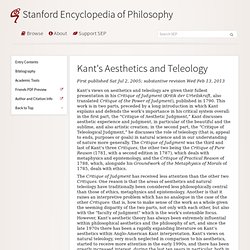
Kantianism. Kantianism is the philosophy of Immanuel Kant, a German philosopher born in Königsberg, Prussia (now Kaliningrad, Russia).
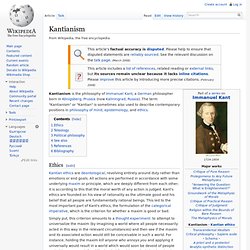
The term "Kantianism" or "Kantian" is sometimes also used to describe contemporary positions in philosophy of mind, epistemology, and ethics. Ethics[edit] Simply put, this criterion amounts to a thought experiment: to attempt to universalize the maxim (by imagining a world where all people necessarily acted in this way in the relevant circumstances) and then see if the maxim and its associated action would still be conceivable in such a world.
For instance, holding the maxim kill anyone who annoys you and applying it universally would result in a world which would soon be devoid of people and without anyone left to kill. Thus holding this maxim is irrational as it ends up being impossible to hold it. Kant's ethics focus then only on the maxim that underlies actions and judges these to be good or bad solely on how they conform to reason. Positivism. Positivism is the philosophy of science that information derived from logical and mathematical treatments and reports of sensory experience is the exclusive source of all authoritative knowledge,[1] and that there is valid knowledge (truth) only in this derived knowledge.[2] Verified data received from the senses are known as empirical evidence.[1] Positivism holds that society, like the physical world, operates according to general laws.
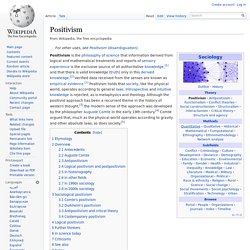
Introspective and intuitive knowledge is rejected, as is metaphysics and theology. Although the positivist approach has been a recurrent theme in the history of western thought,[3] the modern sense of the approach was developed by the philosopher Auguste Comte in the early 19th century.[4] Comte argued that, much as the physical world operates according to gravity and other absolute laws, so does society.[5]